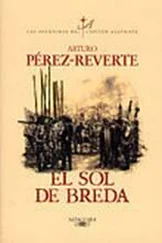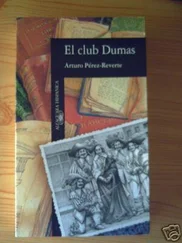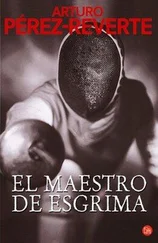“What do we need with this fool?” muttered the captain, as he watched him approach.
Quevedo shrugged. “He’s been given a mission to fulfill. The count-duke himself is pulling the strings. And Master Olmedilla’s work will discomfit quite a number of people.”
Olmedilla greeted us with a curt nod, and we followed him to the Triana gate. Alatriste was speaking to Quevedo in a low voice: “What exactly does he do?”
The poet responded equally softly: “As I said, he’s an accountant, an expert at balancing books. A man who knows everything there is to know about figures, about customs duties and suchlike. Why, he could outshine the mathematician Juan de Leganés.”
“Has someone been stealing more than he should?”
“There is always someone stealing more than he should.”
The broad brim of Alatriste’s hat cast a mask of shadow over his face, a mask that only emphasized the paleness of his eyes, with the light and the landscape of El Arenal reflected in them. “And where exactly do we fit in with all of this?” he asked.
“I’m only acting as intermediary. I am currently much in favor at court. The king requires me to be witty, and the queen laughs at my jokes. As for the count-duke, I do him the occasional small favor, and he repays me in kind.”
“I’m glad to see that Fortune is finally smiling on you.”
“Don’t speak too loudly. Fortune has played so many tricks on me in the past, I view her very warily indeed.”
Alatriste observed the poet, amused. “Nevertheless, don Francisco, you certainly look every inch the courtier.”
“Oh, please, Captain!” Quevedo was tugging at his ruff where it irritated his skin. “Being an artist and enjoying regular hot meals are two activities that are rarely compatible. I am simply having a run of good luck at the moment: I’m popular and my poetry is being read everywhere. As usual, I even have attributed to me poems I did not write, including some monstrosities by that bugger, that Babylonian, that sodomite Góngora, whose grandparents spurned bacon and worked as cobblers in Córdoba, and whose ‘letters patent’ you’ll find hanging from the Cathedral ceiling, along with the names of other Jews. Indeed, I have just hailed his latest published work with a delicate little poem of my own, which ends thus: “Be not flatulent,
Vilest of sewers,
Through which Parnassus
Purges its excrement!
“But to return to more serious matters. As I was saying, it’s convenient to the count-duke to have me on his side. He flatters me and uses me. As for your involvement in the matter, Captain, that is a mere caprice on the part of the count-duke himself. For some reason, he remembers you. Given that we’re talking about Olivares, that, of course, could be a good thing or a bad. Perhaps, in this instance, it’s good. Besides, you did once offer him the services of your sword if he would help save Íñigo.”
Alatriste darted a glance at me, and then nodded slowly and pensively. “He has a damnably good memory, the count-duke,” he said.
“Yes—when it suits him.”
My master again turned his attention to the accountant Olmedilla, who was walking a few paces ahead through the hustle and bustle of the harbor, his hands behind his back and a sour look on his face. “He’s not much of a talker,” he commented.
“No,” said Quevedo, laughing. “In that respect, you and he should get along famously.”
“Is he a man of consequence?”
“As I said, he is merely an official, but he was put in charge of collating all the evidence when don Rodrigo Calderón was put on trial for embezzlement. Now are you convinced?”
He fell silent to allow the captain to absorb all the implications of this statement. Alatriste whistled through his teeth. The public execution a few years ago of a powerful figure like Calderón had shaken all of Spain.
“And whose trail is he on now?”
The poet declined to answer at first and, for a while, said nothing. Then, at last, he said, “Someone will tell you all about that tonight. As for Olmedilla’s mission and, indirectly, yours, shall we just say that the commission comes from the count-duke, but the impulse behind it comes from the king himself.”
Alatriste shook his head incredulously. “You are joking, aren’t you, don Francisco?”
“On my faith, I am not. Devil take me if I am, or may that little humpbacked playwright Ruiz de Alarcón suck all the talent from my brain.”
“God’s blood!”
“That’s exactly what I said when they asked me to be a third party in the matter. On the positive side, if things turn out well, you’ll have a few escudos to spend.”
“And if things turn out badly?”
“Then I’m afraid you’ll wish you were back in the trenches at Breda.” Quevedo sighed and looked around him like someone hoping to change the subject. “I’m just sorry that, for the moment, I can tell you no more.”
“I don’t need to know much more,” said my master, a mixture of irony and resignation dancing in his gray-green eyes. “I just want to know from which side to expect an attack.”
Quevedo shrugged. “From every side, as per usual,” he replied, still gazing indifferently about him. “You’re not in Flanders now, Captain Alatriste. This is Spain.”
They arranged to meet again that night, at Becerra’s. The accountant Olmedilla, still looking glummer than a butcher’s shop in Lent, withdrew to an inn in Calle de Tintores where he had his lodgings and where there was also a room reserved for us. My master spent the afternoon sorting out his affairs, getting his military license certified, and buying new linen and supplies—as well as a new pair of boots—with the money don Francisco had advanced him for the work ahead. As for me, I was free for a few hours, and went for a stroll into the heart of the city, enjoying the walks around the walls and the atmosphere in the narrow streets, with their low arches, coats of arms, crosses, and retablos depicting Christs, virgins, and saints—streets far too narrow for the carriages and horses that jammed them; a place at once dirty and opulent, seething with life, with knots of people at the doors of taverns and tenements, and women—whom I eyed with new interest since my experiences in Flanders—dark-skinned, neat, and self-assured, who spoke with an accent that lent a special sweetness to their conversation. I saw mansions with magnificent courtyard gardens glimpsed through wrought-iron gates, with chains on the door to show they were immune from ordinary justice, and I sensed that while the Castilian nobility, in their determination not to work, took their stoicism to the point of ruin, the Seville aristocracy had a more relaxed approach and often allowed the words “hidalgo” and “merchant” to be conjoined. Thus the aristocrat did not scorn commerce if it brought him money, and the merchant was prepared to spend a fortune in order to be considered an hidalgo—even tailors required purity of blood from the members of their guild. On the one hand, this gave rise to the spectacle of debased noblemen using their influence and privileges to prosper by underhanded means, and on the other, it meant that the work and commerce so vital to the nation continued to be frowned upon and, consequently, fell into the hands of foreigners. Thus, most of the Seville nobility were rich plebeians who had bought their way into a higher stratum of society through money and advantageous marriages and now felt ashamed of their former trades. A generation of merchants spawned, in turn, a generation of “noble,” entirely parasitic heirs, who denied the origins of their fortune and squandered it without a qualm, thus proving the truth of that old Spanish saying From tradesman to gentleman to gambler to beggar in four generations.
Читать дальше











